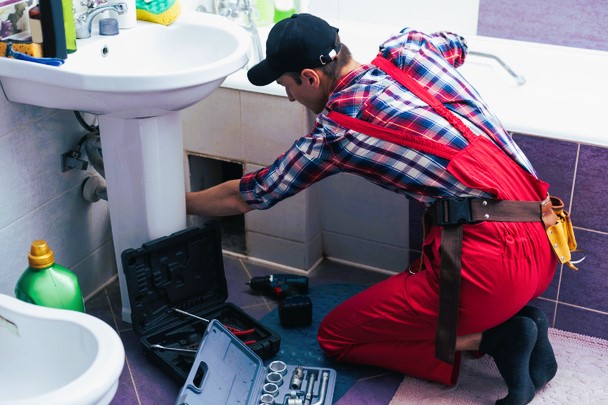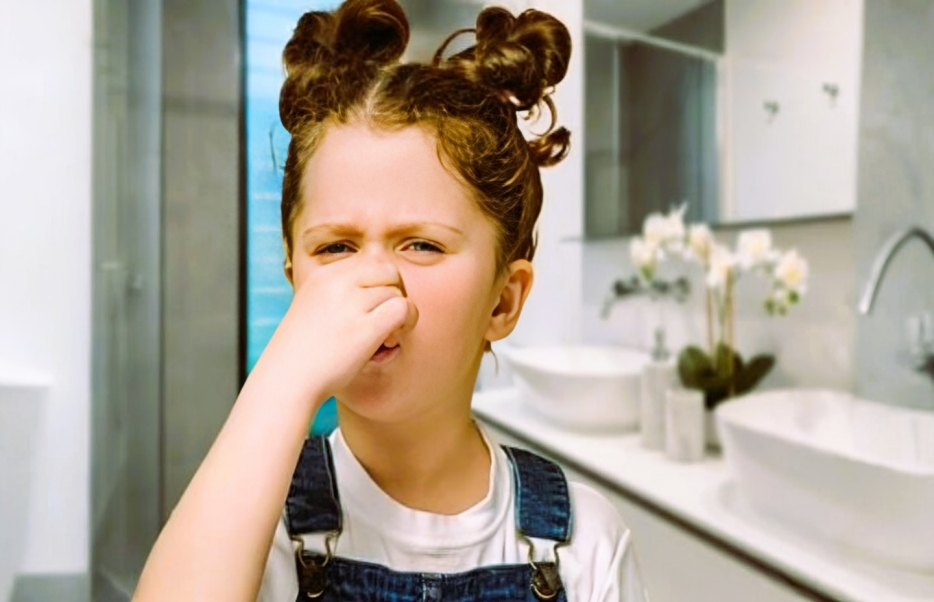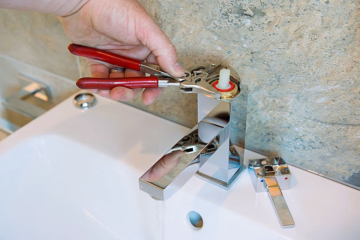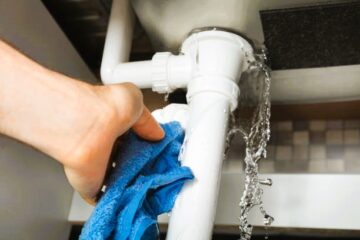It can be frustrating to turn on the water in your bathroom sink and notice a bad smell. This problem is common and usually means there’s an issue with your plumbing. The smell can come from bacteria growing in your sink, a poorly sealed drain, chemical reactions in your pipes, or even water. Everyday things like hair, soap, and skin cells can also get stuck in the drain and start to smell over time. The good news is you can usually fix these problems with simple solutions. In this post, we’ll explain why your bathroom sink might smell, show you some easy DIY fixes, and help you decide when to call a plumber. By the end, you’ll know how to eliminate those unpleasant odors and keep your sink smelling fresh.
Table of Contents
Why Does My Bathroom Sink Smell Bad When I Run Water?
There are a few main reasons why your bathroom sink might smell bad when you run water. Knowing these causes can help you find the right solution.
Bacteria Build-Up
One of the main reasons your bathroom sink smells bad is because of bacteria. Bacteria love damp, moist places; your sink drain is the perfect environment for them to grow. Over time, a thin layer of bacteria, called biofilm, can form in hidden spots like behind the faucet, inside the drain, or even under the sink. You might not see it, but it can cause a sour or musty smell. If you don’t deal with the bacteria, the odor will worsen each time you run water. Regular cleaning can help stop bacteria from building up and causing unpleasant odors.
Improperly Sealed Drains
Sometimes, the smell isn’t from deep in the pipes but from a simple issue with your sink’s drain. If the drain isn’t sealed properly, water and tiny bits of dirt can seep into small gaps around the edges. These small pockets of water become the perfect place for bacteria and mold to grow. This can cause a bad smell whenever you use the sink. Even if the problem seems like it’s coming from the pipes, it might just be that the sink needs a better seal. Fixing this problem is easy—simply resealing the drain with a plumber’s putty or replacing the gasket can stop the smell.
Chemical Reactions in Pipes
If you’ve ever used strong cleaning products like bleach in your sink, you might notice a strange smell after. This is because some cleaning products can react with things already in the drain, like dirt or leftover organic matter. For example, bleach can mix with these materials, creating a lingering chemical smell. This is especially common in older homes with older plumbing systems, as the pipes might react differently to modern cleaning chemicals. If you notice this kind of smell, switching to milder cleaners could help avoid the reaction that’s causing the odor.
Water Quality Issues
Your water itself can also be the source of the smell. If your home has hard water or high sulfur content, you might notice a rotten egg smell when you turn on the tap. This smell comes from the sulfur in the water, which releases hydrogen sulfide. It can be a common issue in areas with sulfur-rich water supplies. The solution to this problem is often as simple as installing a water filter to improve water quality.
Decaying Organic Matter
The buildup of organic matter in the drain. Hair, soap, and skin cells can collect in the pipes over time. As these materials sit in the drain, they break down, creating gases that cause bad smells when you run the water. This buildup happens naturally over time, especially if you don’t regularly clean the sink drain. To fix this, cleaning the drain with enzyme-based cleaners or simple home remedies like vinegar and baking soda can help break down the organic matter and stop the smell.
How Can I Identify Lesser-Known Causes of Bathroom Sink Smells?
To identify lesser-known causes of bathroom sink odors. These steps can help uncover hidden sources of the smell.
Check Behind and Around Your Sink
Inspect areas behind the faucet and around the sink to rule out bacterial colonies for dampness or residue harboring bacteria. Hidden moisture can cause bacteria to grow, producing the foul smell you’re experiencing.
Run Different Types of Water
Suppose the smell is due to water quality; test by separately running hot and cold water. If the scent is more potent with hot water, it may indicate sulfur or mineral issues, especially if your water heater is involved. It’s also helpful to ask neighbors if they are experiencing similar issues, as this could point to a local water quality problem.
Observe Odor Patterns
Pay attention to when the smell appears. If it worsens after using specific cleaning products, this could indicate a chemical reaction within your plumbing. Try switching cleaning agents to see if the smell improves over time.
Look for Moisture Leaks
An improperly sealed drain could leak water beneath the sink, creating a musty smell. Use a flashlight to inspect for damp areas under the sink or signs of mold, which can contribute to an unpleasant odor.
What Are the Best DIY Solutions for Bathroom Sink Smells?
Once you’ve identified the cause of your bathroom sink odor, there are several simple and effective DIY methods to tackle the problem.
Hydrogen Peroxide Rinse
Hydrogen peroxide is a powerful disinfectant that can eliminate odor-causing bacteria in your drain. Pour about 1/4 cup of hydrogen peroxide into the drain and let it sit for 10 minutes. This allows it to break down bacterial buildup. Afterward, flush the drain with boiling water to wash away the residue. This method is a strong alternative to the commonly used vinegar and baking soda solution and is particularly effective at killing bacteria.
Install a Water Filter
If your sink smells due to poor water quality—such as high sulfur content or hard water—a water filtration system can help. Installing a filter designed to remove sulfur, minerals, and other contaminants will improve the smell and quality of the water. You can opt for a faucet filter for localized treatment or a whole-house filtration system for comprehensive water purification. This is especially helpful if you’re dealing with recurring odors from your water supply.
Replace Drain Seals
A poorly sealed drain can trap water and debris in hard-to-reach places, allowing bacteria to thrive. If you’ve noticed water leaks or buildup around the drain, replacing the seal might be the solution. Replacing the gasket or applying fresh plumber’s putty around the drain can create a watertight seal, preventing odors caused by stagnant water. It’s a simple fix that can make a big difference in maintaining a fresh-smelling sink.
Use Enzyme-Based Drain Cleaners
Unlike traditional chemical drain cleaners that can harm your pipes over time, enzyme-based cleaners are a gentler and more eco-friendly option. These products contain natural enzymes that break down organic matter like hair, soap scum, and grease without damaging your plumbing. Regular use of an enzyme-based cleaner can help prevent future buildup and keep your sink free from unpleasant smells.
Improve Ventilation with a Bathroom Fan
If humidity and moisture contribute to the odor, improving the ventilation in your bathroom can help. Installing a bathroom fan can significantly reduce humidity, preventing the growth of bacteria, mold, and mildew. Better air circulation will also help keep your bathroom fresher and limit moisture-related odors.

When to Call a Plumber for Unusual Odors?
If DIY methods don’t work, it may be time to call in a professional. Some plumbing issues, like tree roots infiltrating pipes or blockages deep in the system, require specialized tools and expertise to diagnose and fix. A plumber can locate hidden problems and resolve them before they cause extensive damage to your plumbing system.
Get Rid of Bathroom Sink Smells: A Complete DIY Guide.
Many of our clients have encountered the same frustrating bathroom sink odors described in this blog. Following these easy, step-by-step instructions, they fixed the problem and enjoyed a clean bathroom. If you’re still struggling with persistent odors or want expert advice, visit our website for helpful tips and personalized support. We’re ready to help you tackle any plumbing challenge and keep your home smelling fresh.
FAQs
1. Can my water quality affect the smell in my sink?
Poor water quality, particularly if your water contains sulfur or high mineral content, can cause foul odors when you run the tap
.2. How do I know if the odor comes from a chemical reaction in my pipes?
If the smell worsens after using specific cleaning products, it may be due to a chemical reaction. Switch to different cleaning agents to see if the smell improves.
3. What should I do if the smell persists after trying DIY solutions?
If none of the DIY solutions works, it’s time to call a plumber to investigate possible deep-seated issues in your plumbing system.
4. Can a poorly sealed drain cause odors?
An improperly sealed drain can allow water and debris to accumulate in hard-to-clean places, resulting in bad smells over time.




